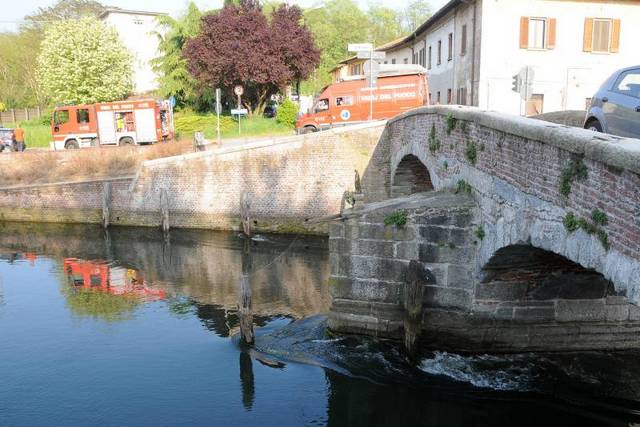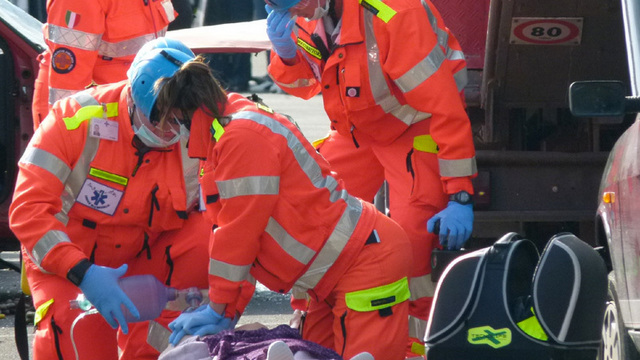Born Again After 42 Minutes Underwater! Posted by Geoff on Feb 17, 2016 in News
How long can someone survive underwater without breathing, 5 minutes, 10 minutes? Did you know that the world record for the “longest time breath held” is an astounding 20 minutes? Makes me feel breathless just thinking about it. Equally amazing, however, is the 42 minutes spent underwater without breathing experienced by a 15 year old Italian boy from Milano.
The 24th of April 2015 was a fine hot day. Michael and his friends decided to cool themselves down by diving into the Naviglio from the bridge at Castelletto di Cuggiono. That fateful decision was to change Michael’s life forever:
“Io, rinato a quindici anni dopo 42 minuti sott’acqua”
”Me, reborn at the age of fifteen after 42 minutes underwater”
Del suo tuffo nel Naviglio dal ponte di Castelletto di Cuggiono ricorda solo la voglia di rinfrescarsi insieme agli amici: “Sono rimasto incastrato con il piede in un ramo. Da lì sono partiti i 42 minuti sott’acqua. Quel che è successo da quel momento me l’hanno raccontato”.
Of his dive into the Naviglio from the Castelletto di Cuggiono bridge he remembers only the urge to cool himself down along with his friends: “My foot got trapped in a branch. That’s when my 42 minutes underwater began. What happened from that moment on has been recounted to me by others”.
Quando i sommozzatori dei vigili del fuoco l’hanno ripescato, Rossella Giacomello, il medico rianimatore del 118, si è trovata davanti a un giovane cianotico e in arresto cardiaco: “Intorno a me c’era chi mi diceva di non accanirmi su un cadavere, ma io volevo assolutamente continuare la rianimazione” – ricorda -.
When the Fire Brigade divers fished him out, Rossella Giacomello, the 118 resuscitator (118 is the Italian emergency services number), found herself before a bluish youth who’s heart had stopped beating: “Around me people were telling me not to persist with a corpse, but I absolutely wanted to continue with the resuscitation” – she remembers -.
“Non potevo credere che un ragazzo morisse per un gioco in una bella giornata d’aprile. La temperatura fredda era l’unica cosa che mi faceva sperare (l’acqua ghiacciata ha protetto i centri vitali di Michael). E a un certo punto il suo cuore ha ridato un segnale”.
“I couldn’t believe that a lad could die because of a game on a beautiful April’s day. The cold was the only thing that gave me hope (the icy water protected Michael’s vital organs). And at a certain point his heart gave a sign (of life)”.
“È successo qualcosa oltre il limite, qualcosa di misterioso – ammette Alberto Zangrillo, primario di Anestesia e rianimazione dell’ospedale San Raffaele -. Noi medici di solito dobbiamo fare scelte razionali. In quel momento non lo siamo stati. Per fortuna”.
“Something beyond the limits happened, something mysterious – admits Alberto Zangrillo, head of anaesthesia and resuscitation at San Raffaele hospital (Milan) –. We doctors usually have to make rational decisions. In that moment we didn’t. Luckily”.
L’intuizione dei medici è stata di attaccare Michael all’Ecmo, la macchina che si sostituisce al cuore e ai polmoni e permette la circolazione extracorporea. Una decisione che gli ha salvato la vita.
The doctors’ intuition was to attach Michael to the Ecmo (Extracorporeal Membrane Oxygenation), the machine that substitutes the heart and lungs and allows extracorporeal circulation. A decision that saved his life.
Michael sa di essere un miracolato, ma non nasconde la fatica delle giornate di riabilitazione che gli hanno permesso di reimparare a muoversi e a parlare, né teme di raccontare le sue debolezze: “C’è da dire che ho perso una gamba – sospira -. E ci sono difficoltà nella ripresa”.
Michael knows that he was miraculously saved, but he doesn’t hide the difficulty of the days of rehabilitation, which have allowed him to learn how to move and talk again, nor is he afraid of speaking about his weaknesses: “It has to be said that I lost a leg – he sighs –. And it’s difficult to get going again”.
I medici sono stati costretti ad amputargli l’arto destro per un problema cardiovascolare sorto come conseguenza dei tubi che gli sono stati infilati nel corpo per attaccarlo all’Ecmo. È l’unico momento in cui interviene anche il padre: “Purtroppo a Michi non è ancora stata applicata la protesi che gli permetterebbe di tornare a camminare – spiega –. Ci sono ritardi burocratici”.
The doctors were forced to amputate the right limb due to a cardiovascular problem which came about as a result of the tubes that were inserted into his body to attach him to the Ecmo. It’s the only moment in which his father intervenes (in the interview): “Unfortunately Michi still hasn’t had the prosthetic limb fitted that will allow him to walk again – he explains –. There are bureaucratic delays”.

Build vocabulary, practice pronunciation, and more with Transparent Language Online. Available anytime, anywhere, on any device.







Comments:
john coletti:
amazing story. Very lucky to be alive.